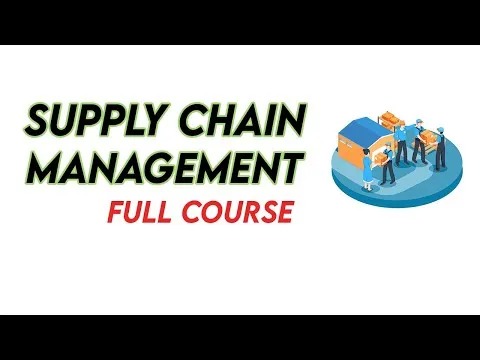
Supply Chain Management Strategy 
This course provides the essential direction for managing a successful supply chain. Through the use of real-life case scenarios, learners will gain the tools and techniques needed to create a supply chain management strategy. Upon completion, learners will have demonstrated mastery of the skills necessary to effectively manage a complex network of companies. ▼
ADVERTISEMENT
Course Feature
![]() Cost:
Cost:
Free
![]() Provider:
Provider:
Coursera
![]() Certificate:
Certificate:
Paid Certification
![]() Language:
Language:
English
![]() Start Date:
Start Date:
31st Jul, 2023
Course Overview
❗The content presented here is sourced directly from Coursera platform. For comprehensive course details, including enrollment information, simply click on the 'Go to class' link on our website.
Updated in [March 06th, 2023]
This course, Supply Chain Management Strategy, is the capstone of the Supply Chain Management specialization. It is designed to provide learners with the tools and techniques to successfully manage a complex network of companies that we call the supply chain. Learners will use the skills acquired in the previous four courses to create a supply chain management strategy in a real-life case scenario. At the completion of this course, learners will have demonstrated mastery of the tools and techniques to successfully manage a successful supply chain.
[Applications]
Upon completion of this course, students should be able to apply the knowledge and skills acquired to develop a comprehensive supply chain management strategy. This strategy should include the identification of key stakeholders, the development of a supply chain network, the selection of appropriate technology, and the implementation of a plan to ensure the successful execution of the strategy. Additionally, students should be able to identify and analyze potential risks and develop strategies to mitigate them. Finally, students should be able to evaluate the effectiveness of the strategy and make necessary adjustments to ensure its success.
[Career Paths]
1. Supply Chain Manager: Supply Chain Managers are responsible for overseeing and managing the entire supply chain process. They are responsible for developing and implementing strategies to ensure the efficient and cost-effective flow of goods and services from suppliers to customers. They must also ensure that the supply chain is compliant with all applicable laws and regulations. As the demand for supply chain management increases, the need for Supply Chain Managers is expected to grow.
2. Logistics Manager: Logistics Managers are responsible for overseeing the transportation and storage of goods. They must ensure that goods are delivered on time and in the most cost-effective manner. They must also ensure that the goods are stored in the most efficient way possible. Logistics Managers must also be able to develop and implement strategies to improve the efficiency of the supply chain.
3. Procurement Manager: Procurement Managers are responsible for overseeing the procurement process. They must ensure that the right goods and services are purchased at the right price and in the right quantity. They must also ensure that the procurement process is compliant with all applicable laws and regulations. As the demand for procurement increases, the need for Procurement Managers is expected to grow.
4. Supply Chain Analyst: Supply Chain Analysts are responsible for analyzing the supply chain process and identifying areas of improvement. They must be able to develop and implement strategies to improve the efficiency of the supply chain. They must also be able to identify and analyze trends in the supply chain and make recommendations for improvement. As the demand for supply chain analysis increases, the need for Supply Chain Analysts is expected to grow.
[Education Paths]
1. Bachelor of Science in Supply Chain Management: This degree program provides students with the knowledge and skills necessary to manage the supply chain of a business. Students learn about the principles of supply chain management, including inventory management, logistics, and operations. They also learn about the latest technologies and trends in the industry, such as artificial intelligence, blockchain, and big data. This degree is becoming increasingly popular as businesses look to optimize their supply chain operations.
2. Master of Science in Supply Chain Management: This degree program is designed for those who want to take their knowledge of supply chain management to the next level. Students learn advanced concepts in supply chain management, such as supply chain analytics, risk management, and sustainability. They also gain an understanding of the latest technologies and trends in the industry, such as the Internet of Things, robotics, and 3D printing. This degree is ideal for those who want to become leaders in the field of supply chain management.
3. MBA in Supply Chain Management: This degree program is designed for those who want to gain a comprehensive understanding of the business side of supply chain management. Students learn about the principles of business management, such as finance, accounting, and marketing. They also gain an understanding of the latest technologies and trends in the industry, such as predictive analytics and blockchain. This degree is ideal for those who want to become executives in the field of supply chain management.
4. Doctor of Philosophy in Supply Chain Management: This degree program is designed for those who want to become experts in the field of supply chain management. Students learn advanced concepts in supply chain management, such as supply chain analytics, risk management, and sustainability. They also gain an understanding of the latest technologies and trends in the industry, such as the Internet of Things, robotics, and 3D printing. This degree is ideal for those who want to become researchers and academics in the field of supply chain management.
Course Syllabus
What is Supply Chain Strategy
In this module you will be introduced to the business case that you will work on over the duration of this course. The goal of this part is to determine the overall direction of your improvement efforts. After completing this module, you will be able to recognize the issues in a business better as well as customize your specific recommendations in the remainder of the course.Logistics at MTC
In this module, you are going to examine the logistics challenges that MTC faces. In addition to examining the current state of the company's logistics, you will make recommendations to improve the company's logistics. After completing this module, you will have demonstrated the ability to recognize a company's logistical challenges and make appropriate recommendations to overcome those issues.Operations at MTC
In this module, you are going to examine the operations challenges that MTC faces. In addition to examining the current state of the company's operations, you will make recommendations to improve the company's flow of products to the customers. After completing this module, you will have demonstrated the ability to recognize a company's operational challenges and make appropriate recommendations to overcome those issues.Planning at MTC
In this module, you are going to examine the planning challenges that MTC faces. In addition to examining the current state of the company's demand planning and fulfillment, you will make recommendations to improve the company's forecasting. After completing this module, you will have demonstrated the ability to recognize a company's forecasting and demand planning challenges and make appropriate recommendations to overcome those issues.Sourcing at MTC
In this module, you are going to examine the sourcing challenges that MTC faces. In addition to examining the current state of the company's procurement activities, you will make recommendations to improve the company's relationships with its suppliers as well as their ability to take advantage of closer relationships with its customers. After completing this module, you will have demonstrated the ability to recognize a company's sourcing challenges and make appropriate recommendations to overcome those issues.The Solution
In this module, you are going to craft a cumulative presentation of all your recommendations. After completing this module, you will have demonstrated the ability to present a cohesive and logical argument to support your recommendations.Pros & Cons

Challenging capstone project

Fun, dynamic and smart

Good refresher

Interesting and enthusiastic

Rigorous and informative

Reallife problem dealing

Not difficult enough

Poor grading mechanism

Lack of oversight and control
Course Provider

Provider Coursera's Stats at AZClass
Supply Chain Management Strategy provides essential guidance for managing a successful supply chain. Using real-world case scenarios, learners will acquire the tools and techniques needed to create supply chain management strategies. Learners will develop an understanding of the fundamentals of supply chain management, including the different components of a supply chain, the importance of supply chain strategy and the role of technology in supply chain management. Learners will learn how to develop a strategic plan for a supply chain including how to identify and analyze customer needs, develop a competitive strategy, and develop a supply chain strategy.
Discussion and Reviews
0.0 (Based on 0 reviews)
Explore Similar Online Courses

Python for Machine Learning

Children and young peoples participation

Python for Informatics: Exploring Information

Social Network Analysis

Introduction to Systematic Review and Meta-Analysis

The Analytics Edge

DCO042 - Python For Informatics

Causal Diagrams: Draw Your Assumptions Before Your Conclusions

Whole genome sequencing of bacterial genomes - tools and applications

MIT Free Supply Chain Management Courses

What Are Good Supply Chain Certifications?


Start your review of Supply Chain Management Strategy